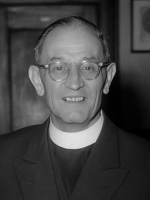| Friedrich Gustav Emil Martin Niemöller | |
| 弗里德里希·古斯塔夫·埃米尔·马丁·尼莫拉 | |
| 马丁·尼莫拉 | |
| Death Place: | 威斯巴登 |
| | |
Friedrich Gustav Emil Martin Niemöller (German: [ˈmaʁ.tiːn ˈniː.mœ.lɐ] (![]() listen); 14 January 1892 – 6 March 1984) was a German theologian and Lutheran pastor. He is best known for his opposition to the Nazi regime during the late 1930s and for his widely quoted poem "First they came..." The poem has many different versions, one of which begins "First they came for the Communists, and I did not speak out—because I was not a Communist," and concludes, "Then they came for me—and there was no one left to speak for me."
listen); 14 January 1892 – 6 March 1984) was a German theologian and Lutheran pastor. He is best known for his opposition to the Nazi regime during the late 1930s and for his widely quoted poem "First they came..." The poem has many different versions, one of which begins "First they came for the Communists, and I did not speak out—because I was not a Communist," and concludes, "Then they came for me—and there was no one left to speak for me."
He was a national conservative and initially a supporter of Adolf Hitler, but he became one of the founders of the Confessing Church, which opposed the Nazification of German Protestant churches. He vehemently opposed the Nazis' Aryan Paragraph, but made remarks about Jews that some scholars have called antisemitic. For his opposition to the Nazis' state control of the churches, Niemöller was imprisoned in Sachsenhausen and Dachau concentration camps from 1938 to 1945. He narrowly escaped execution. After his imprisonment, he expressed his deep regret about not having done enough to help the victims of the Nazis. He turned away from his earlier nationalistic beliefs and was one of the initiators of the Stuttgart Declaration of Guilt. From the 1950s on, he was a vocal pacifist and anti-war activist, and vice-chair of War Resisters' International from 1966 to 1972. He met with Ho Chi Minh during the Vietnam War and was a committed campaigner for nuclear disarmament.

